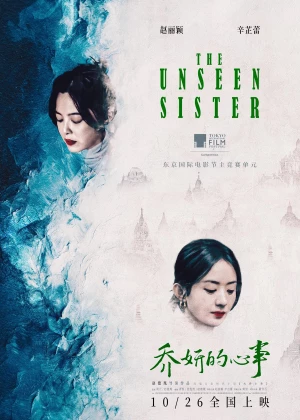The Unseen Sister
After watching Nina Wu, I immediately put director Midi Z on my radar. I still managed to miss out on his next film, but it appears his work struggles with proper international distribution. Luckily, The Unseen Sister [Qiao Yan De Xin Shi], his latest feature, fared a bit better in that regard. The release came out of nowhere and I went in completely blank, but that's how I prefer to watch my films. While not quite as intense as his best work, The Unseen Sister was a pleasant confirmation that Midi Z is one of the more interesting Chinese directors working today.
![screencap of The Unseen Sister [Qiao Yan De Xin Shi]](/thumbs/img/articles/1200xauto/unseen-sister-1.webp)
Midi Z is best known for his semi-documentary work, though I haven't been able to watch any of these films (yet, I guess I'll have to make a bit more of an effort). It wasn't until Nina Wu crossed my path that I got wind of this director. His mix of social relevance and stark genre elements stood out, as it's not a combo often seen in Chinese cinema. Usually, there's a strong dominant angle, but Midi Z managed to combine them in equal measures. The same goes for The Unseen Sister, which tackles China's one-child policy and wraps it up in a neat mystery/thriller.
I assume Midi Z gets away with this type of material as he doesn't condemn China's former policies too harshly, or at least not the way they corrected them. Instead, they form the premise for a truckload of human suffering that comes back to haunt the characters in their later lives. How everything is connected is slowly revealed throughout the film, shifting the power balance between four individuals as they try to come to grips with their past and the way it affects their current lives. It's a nice enough setup that kept me engaged throughout, as long as you don't expect any major plot twists.
Qiao Yan is a lauded actress. She is done with the film business and wants to retire, the boss of the film studio isn't too happy with Yan's decision but can't seem to change her mind. Out of the blue Yan gets a message from her sister who lives in Myanmar. They haven't seen each other in 17 years, but she tells Yan that she's coming to visit her in Beijing. Yan's sister is running for her husband's debt collectors and hopes Yan can help, but she's too proud to ask for money directly. The two share a secret that nobody knows about, related to their mysterious past.
![screencap of The Unseen Sister [Qiao Yan De Xin Shi]](/thumbs/img/articles/1200xauto/unseen-sister-2.webp)
The cinematography is stylish but in a rather traditional way. It's certainly not as colorful or playful as other contemporary Chinese films I've covered here this past year. The color palette is more muted and grim, the camerawork is slower and more deliberate, and the editing is more spacious. The film looks good though. It certainly fits the vibe and there are some beautiful shots scattered throughout, though I do think Z could've pushed it a little further. China has a reputation to uphold and while this film doesn't falter, it's not up there with the best.
What The Unseen Sister may lack in pure visual prowess is compensated with a score that's a definite step up from the Chinese norm. It's not that the music stands out or pulls all the attention towards itself, but there seems to be a bit more thought behind it than is usually the case. Again, the music itself is quite traditional and by the numbers, don't expect to be humming any tunes once the credits start rolling, but the way it is used to enhance scenes by raising tension or supporting dramatic highlights is proper and more than I would've expected from a Chinese film.
The performances are on point without anyone in the cast standing out or hogging all the attention. Liying Zhao and Zhilei Xin do a good job as estranged sisters trying to reconnect after years of silence, Jue Huang aces his part as Yan's charming but emotionally immature boss. The weight of the film rests on the shoulders of these three, the rest of the cast is stuck in more supportive roles. It's a solid cast that manages to keep a good balance between genre and drama, though a little extra dash of charisma wouldn't have hurt.
![screencap of The Unseen Sister [Qiao Yan De Xin Shi]](/thumbs/img/articles/1200xauto/unseen-sister-3.webp)
The Unseen Sister is a relatively straightforward drama, still, it took me a while before I knew where Midi Z was going with it. That's because some of the side plots introduce different genre elements, some of them ending up dominating the film for a short while before shifting back to more comfortable drama territories. It's a tricky balancing exercise and there are some moments where it almost uprooted the film, but in the end, Midi Z pulled it off and gave this movie an extra dash of spice. Without it, The Unseen Sister might've been a tad too plain for me.
Compared to Nina Wu this was an ever-so-slight disappointment, mostly because it felt like a more traditional film. Scratch that comparison and The Unseen Sister is a killer film though. The stylish cinematography, the tailored score, and the strong performances lend the plot the necessary credibility, the little genre touches are the icing on the cake. I doubt the film will enjoy a wider international release, which means availability will be an issue, but fans of Chinese cinema are no doubt used to that by now. Just get your hands dirty and enjoy another little gem.
